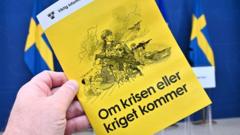On Monday, millions of Swedes will receive an updated edition of the civil preparedness pamphlet "If the crisis or war comes," emphasizing how citizens can prepare for potential conflicts and crises. This revised guide, the first significant update in six years, comes in response to increasing security threats, specifically the implications of Russia's full-scale invasion of Ukraine. The new edition is twice the size of its predecessor and aims to ensure that households are better informed.
Finland has also launched a digital resource titled “Preparing for Incidents and Crises” to guide its residents on how to respond to armed attacks. Notably, Finland has opted against printing physical copies to save costs and allow for easier updates, instead delivering the content via online platforms.
Norway has issued its own pamphlet, distributed to 2.2 million households, encouraging self-sufficiency amidst extreme weather, military conflicts, and various emergencies. The Norwegian government has taken previous feedback into account, updating this guidance based on the increased prevalence of climate-related disasters, from floods to landslides.
In both Sweden and Finland, the historical context of their defense strategies is significant. Sweden's Ministry of Civil Defence, led by Carl-Oskar Bohlin, acknowledges that changing geostrategic conditions necessitate updated information for citizens. This is particularly relevant as Sweden, having recently joined NATO, can no longer rely on the notion of neutral states that characterized its past.
Finland, which shares a long border with Russia and has a history of conflict dating back to World War II, maintains a robust defense framework. Recent concerns surrounding the potential for war have prompted citizens to consider their personal preparedness more seriously. A university student from Finland, Melissa Eve Ajosmaki, expresses a mindset influenced by her family's safety back home, despite feeling less anxious than when the Ukraine conflict began.
The guides offer practical advice, instructing individuals to stockpile provisions for at least 72 hours. Essential items include non-perishable foods such as beans, pasta, and iodine tablets. While many express gratitude for this preparedness information, questions arise about the practicality of maintaining such stocks, especially in compact living conditions.
As Nordic countries adapt to the world around them, the emphasis remains on equipping their populations with essential survival knowledge should a crisis arise.





















